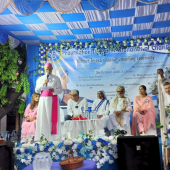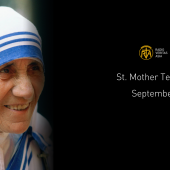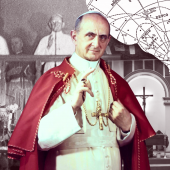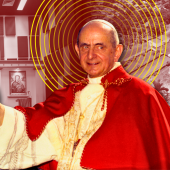Mother Teresa: Seven Timeless Lessons

In a world where leaders chase applause and institutions drift without anchors, Mother Teresa remains a luminous example of what authentic leadership looks like. Her legacy transcends charity work; it is a masterclass in living with unwavering purpose. Seven principles guided her extraordinary life, and they offer timeless wisdom for anyone seeking to lead with genuine meaning.
Clarity of Mission
From the moment she stepped into Calcutta’s slums, there was never any question about what she stood for, serving “the poorest of the poor.” That razor-sharp focus became her North Star, guiding every decision and action. Most organizations stumble not from lack of effort but from lack of direction. Our personal lives mirror this struggle. Without a clearly defined purpose, we find ourselves perpetually busy yet profoundly unfulfilled. When Mother Teresa said, “Give yourself fully to God. He will use you to accomplish great things,” she was not speaking only to the faithful. She was revealing a fundamental truth: we must anchor ourselves to something greater than our own comfort or ambition.

Courage
Critics attacked her relentlessly, questioning everything from her medical practices to her fundraising methods. Yet her integrity remained unshakeable. In one powerful instance, she refused a substantial donation from a regime notorious for human rights violations. That money could have funded an entire hospital wing, but accepting it would have poisoned the soul of her work. How often do we compromise our principles for convenience or advancement? Her unwavering resolve reminds us that authentic leadership requires taking unpopular stands when core values are threatened.
Divine Timing
While our culture worships speed and instant results, Mother Teresa waited nearly two decades before founding the Missionaries of Charity. Those years were not idle; she taught at a convent school while closely observing the desperate conditions just outside its gates. This period of preparation allowed her to understand the context deeply, build essential relationships, and strengthen herself spiritually for the monumental challenges ahead. “We must never be in a hurry,” she once observed. “What is meant to happen will happen in its own time.” Whether launching a venture, changing careers, or making any significant life decision, her story reminds us that wisdom often grows in seasons of patient waiting.
Struggle with Uncertainty
She embraced darkness as a sacred teacher. Private letters, made public years after her death, exposed her profound spiritual struggles, periods when she felt completely abandoned by God, lasting for years. She wrestled with questions about her faith, her mission, even her worthiness. Yet she pressed forward. In our certainty-obsessed culture that punishes any sign of hesitation, her vulnerability was revolutionary. She demonstrated that doubt is not the enemy of faith; it is an integral part of any meaningful journey. Doubt refines our motives, deepens our understanding, and shields us from dangerous arrogance. In our roles as parents, leaders, or colleagues, admitting uncertainty does not diminish our credibility; it enhances our humanity and invites genuine collaboration.

Action
Understanding your purpose means nothing without living it out completely. Mother Teresa did not merely speak about love; she embodied it by walking into disease-ravaged alleys, tenderly cleaning infected wounds, holding the hands of the dying, and personally serving countless meals. Her divine calling came as a whisper, “Come be my light,” she described it, and she responded with absolute devotion. We all receive such whispers in different forms: neglected talents begging for expression, causes that stir our hearts, and roles we are uniquely equipped to fill. She challenges us to stop ignoring these calls. Your purpose does not need to shake the world; it simply needs to be genuine.
Humanity
A volunteer once watched her gently wash the feet of a dying man whose body was covered in festering sores. When he asked how she could bear such a sight, she smiled peacefully and replied, “Because I see the face of Christ in him.” This was not merely religious devotion, it was an unwavering commitment to recognizing inherent worth where others saw only disgrace. This principle transforms every interaction we have, from how we treat difficult employees to how we respond to family members who frustrate us to how we encounter strangers on the street.

Radical Service
Mother Teresa never pursued titles, positions, or traditional markers of authority. Her extraordinary influence flowed from her willingness to get her hands dirty, to remain present during the most difficult moments, to consistently choose the lowest place rather than the highest seat. She understood that genuine leadership is not about commanding from elevated positions; it is about serving from within the struggle. Her simple white sari with blue stripes became more recognizable worldwide than any corporate uniform because it represented authentic care in action.
These are not abstract ideals meant only for saints. Whether you are running a multinational corporation or nurturing a family, seeking your life’s direction or completely reinventing yourself, Mother Teresa’s seven principles provide a robust framework for meaningful leadership.
Define your purpose with crystal clarity.
Choose your values over popularity every single time.
Trust in perfect timing.
Welcome doubt as a wise teacher.
Transform knowledge into decisive action.
See inherent dignity in every person you encounter.
Lead through humble service rather than positional authority.
In our current era, when leadership often feels performative, transactional, and hollow, Mother Teresa’s legacy calls us toward profound depth. Not everyone will relocate to serve in Calcutta or launch global humanitarian missions. But every one of us can pause, listen carefully, and begin living from a place of authentic purpose. Her seven principles are not merely guidelines for effective leadership; they are invitations to a life of extraordinary meaning.
Radio Veritas Asia (RVA), a media platform of the Catholic Church, aims to share Christ. RVA started in 1969 as a continental Catholic radio station to serve Asian countries in their respective local language, thus earning the tag “the Voice of Asian Christianity.” Responding to the emerging context, RVA embraced media platforms to connect with the global Asian audience via its 21 language websites and various social media platforms.














